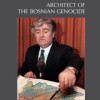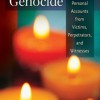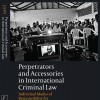Books

The Armenian Genocide Legacy – edited by Alexis Demirdjian
On the centennial of the acts commonly referred to as the Armenian Genocide, academics and professionals from a variety of disciplines discuss the impact of the Genocide in their respective fields. In this volume, they assess why it still remains relevant to discuss the Genocide today, as well as its global ramifications and its equally…
Read more
Holy Legionary Youth – Roland Clark
Founded in 1927, Romania’s Legion of the Archangel Michael was one of Europe’s largest and longest-lived fascist social movements. In Holy Legionary Youth, Roland Clark draws on oral histories, memoirs, and substantial research in the archives of the Romanian secret police to provide the most comprehensive account of the Legion in English to date. Clark…
Read more
Das Lachen der Täter: Breivik u.a. Psychogramm der Tötungslust Klaus Theweleit
Vom Lachen der Killer wird in zahlreichen Fällen berichtet, aber selten wird es in seiner zentralen Bedeutung gedeutet – so die provokante These dieses Psychogramms. In den „Männerphantasien“ wagte Theweleit erstmals eine Beschreibung des gewalttätigen faschistischen Mannes und seines innerlich fragmentierten, äußerlich aber gepanzerten Körpers. Auf diese bahnbrechende Theorie greift er nun zurück, um die…
Read more
The New Demons. Rethinking Power and Evil Today – Simona Forti
As long as we care about suffering in the world, says political philosopher Simona Forti, we are compelled to inquire into the question of evil. But is the concept of evil still useful in a postmodern landscape where absolute values have been leveled and relativized by a historicist perspective? Given our current unwillingness to judge…
Read more
Evil Men – James Dawes
Presented with accounts of genocide and torture, we ask how people could bring themselves to commit such horrendous acts. A searching meditation on our all-too-human capacity for inhumanity, Evil Men confronts atrocity head-on—how it looks and feels, what motivates it, how it can be stopped. Drawing on firsthand interviews with convicted war criminals from the…
Read more
The Media of Testimony. Remembering the East German Stasi in the Berlin Republic – Sara Jones
In The Media of Testimony, Sara Jones examines the use of eyewitness testimony in different cultural forms. The focus is on memories of the East German State Security Service (Stasi) in autobiographical writing, memorial museums and documentary film. Combining theoretical models from diverse disciplines, Jones develops a distinctive and interdisciplinary approach to testimony, memory and…
Read more
Radovan Karadžič. Architect of the Bosnian Genocide – Robert J. Donia
Radovan Karadžić, leader of the Bosnian Serb nationalists during the Bosnian War (1992–1995), stands accused of genocide and other crimes of war before the International Criminal Tribunal for the former Yugoslavia in The Hague. This book traces the origins of the extreme violence of the war to the utopian national aspirations of the Serb Democratic…
Read more
Encountering Genocide. Personal Accounts from Victims, Perpetrators, and Witnesses – Paul R. Bartrop
From the atrocities of the Holocaust to the ongoing horrors in Darfur, genocide has been a gruesome and all-too-prominent fixture of modern history. There is no better way to examine and understand these events than through the accounts of those involved. This unique collection of primary sources features 50 documents, some of which have never…
Read more
Perpetrators and Accessories in International Criminal Law. Individual Modes of Responsibility for Collective Crimes – Neha Jain
International criminal law lacks a coherent account of individual responsibility. This failure is due to the inability of international tribunals to capture the distinctive nature of individual responsibility for crimes that are collective by their very nature. Specifically, they have misunderstood the nature of the collective action or framework that makes these crimes possible, and…
Read more
Totalitarian Dictatorship. New Histories
This volume takes a comparative approach, locating totalitarianism in the vastly complex web of fragmented pasts, diverse presents and differently envisaged futures to enhance our understanding of this fraught era in European history. It shows that no matter how often totalitarian societies spoke of and imagined their subjects as so many slates to be wiped…
Read more
